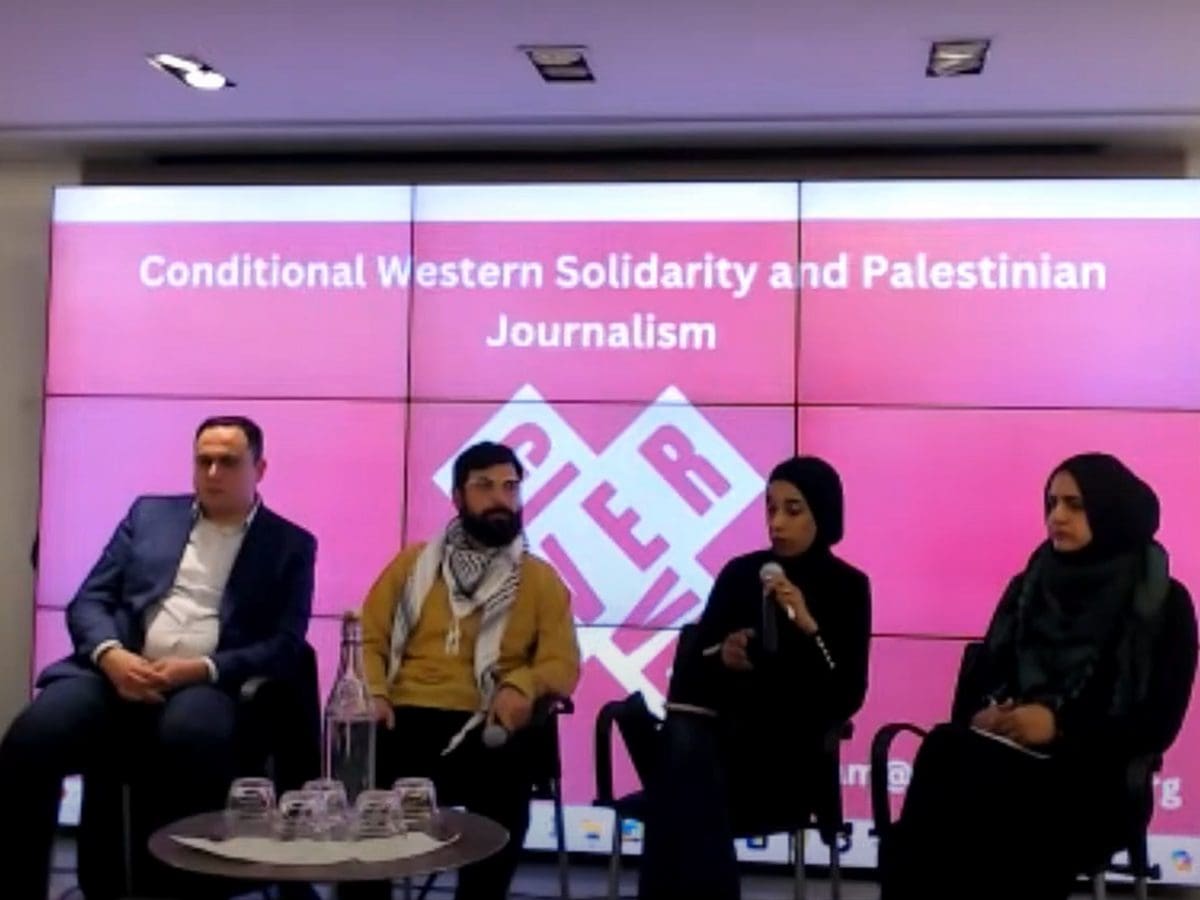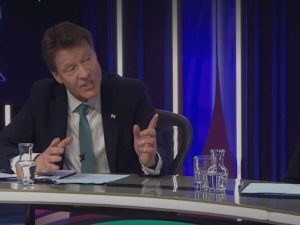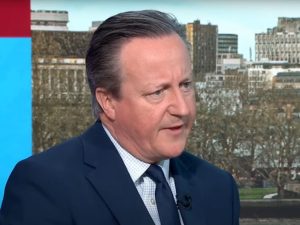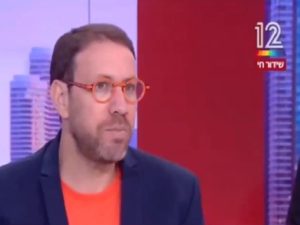Western journalists are complicit in Israel’s brutal targeting and murder of Palestinians in Gaza. Their “pointed silence”, as the criminal Zionist state slaughters fellow members of the press, reveals that Western media solidarity is conditional, and rooted in white supremacy and Islamophobia. These were the key take-aways of a vital panel discussion border abolition project Give Over hosted in London on 9 March.
White supremacy of the Western media
Writer and researcher on Islamophobia, and former Canary journalist and editor Maryam Jameela (she/he), hosted the panel.
Jameela launched the event, posing a number of key issues for the panelists to discuss over the Western media’s response to Israel perpetrating its brutal genocide in Gaza.
First, she noted how Western media as a whole has omitted vital conversations on the role of white supremacy in newsrooms and in Western reportage itself:
most of us in this room will probably have been to journalism seminars or events that are about innovative journalism, and what do we do next, how do we do it? But the things that these events often miss is white supremacy and the white supremacist impulse to only grieve, gather, and mourn around lives in the Global North and white bodies.
As a result, he argued that Western journalists are implicitly responsible for perpetuating this violence against Palestinian journalists:
Our Palestinian colleagues are dying in front of a complicit audience and western journalists, whether they work for indy outlets or legacy media, are inextricably linked to what’s happening in Palestine, we can’t remove ourselves from it.
Specifically, he said that Western journalists’ “pointed silence” highlights the fact that journalistic solidarity is “conditional”. In other words, the Western media’s inherent role in maintaining structures of white supremacist power, has meant that Western journalists and outlets have readily abandoned their Palestinian colleagues in the face of Israel’s criminal colonial atrocities.
As such, she asked what the point of journalism is:
if we have people dying in the dark? What is the point of our journalism and our approach and our innovation – what is the use of any of it, if that’s where we are?
Panelists proceeded to explore Jameela’s prescient, critical questions on the role of the Western media, and its abject failure to support Palestinian reporters in their time of greatest need.
A “moral and ethical responsibility”
First up, Palestinian journalist Ahmed Alnaouq took the floor to talk about his experience interacting with the Western press.
Alnaouq is co-founder of We Are Not Numbers, a non-profit that mentors writers in Palestine to help them disseminate their stories in English to a world audience. He is also outreach officer for the EuroMed Human Rights Monitor. Alnaouq declared to the panel how:
I did not choose journalism – journalism chose me.
Notably, he explained that he entered journalism:
because in Gaza, someone like me who spoke English before getting to the field of journalism or work, or starting a career, I feel that we Palestinians who can speak English we have a moral and ethical responsibility to report the news because we have been failed over the past 75 years, not only in Gaza and Palestine, we have been failed by the Western media.
Thus, any one of us who could send a message to the world, they have a moral and ethical responsibility to do so.
For Alnaouq, the way in which the media had been reporting on Israel’s brutal settler occupation and Apartheid regime had pushed him towards the profession. He described how Israel’s harrowing murder of his older brother had instigated him speaking out through the press:
After I lost my brother and saw how the media reported on this war in 2014, I decided that I must do something about it.
Then, Alnaouq’s experience reporting in the 2018-19 Great March of Return protests at the Gaza border cemented for him the Western media’s complicity in Israel’s violent crimes. Alnaouq told the panel that:
I saw all the media reporting and taking pictures. Then when I go back to home, I would see how these media outlets reported what’s happened. And well for me, that was the start… On the fourteenth May, 59 Palestinians were killed in Gaza at the March of Return, thousands were injured, and then the BBC wrote their story. ‘59 Palestinians die at the Gaza border’
That story did not name the killer. For example, it did not say who killed these people. It did not say how they died. They were not misplaced, they were not lost, they were killed with butterfly bullets. They were killed while protesting peacefully.
That story did not say that these people were protesting, asking, demanding the right of return. Did not say anything about the Nakba, that made 70% of Palestinians in Gaza refugees. It did not even quote Palestinians. They did not quote the organisers of the March of Return. It was full of bias against the Palestinian people and I saw that with my own eyes.
So, when Israel brutally murdered 21 members of his family on 22 October, Alnaouq explained how the Western media’s disinterest didn’t come as a surprise:
I knew after I lost my family, if I did not force the media to write about my family, they will never do, because they’re not interested in Palestine. So I started posting about my family on Twitter. And after my story got told and thousands and thousands of people shared my tweets, the Western media was forced to interview me and do some stories with me.
However, he explained how what followed underscored the double standards in Western media reporting. Specifically, he drew attention to the fact that Western media outlets had lapped up Israel’s propaganda over lies such as the forty beheaded babies claim. Meanwhile, his family’s horrifying massacre had courted high levels of journalistic scrutiny. He said that:
They were not convinced that I actually lost my family.
As such, he expressed how the disbelief that Western outlets subjected him to is part and parcel of the dehumanisation of Palestinian lives and a deprioritising of Palestinian voices meted out by Israel and a complicit Western press.
The “double standard and hypocrisy of Western media”
Next, Palestinian journalist and writer from Al-Quds City, Mustafa Abu Sneineh articulated further the moral failure of Western media hypocrisy. On top of this, he explored the cowardice Western journalists have displayed since Israel began its deadly siege.
To start, Sneineh referred to Israel’s murder of Al Jazeera journalist Shireen Abu Akleh as:
one of the stark examples of the double standard and hypocrisy of Western media.
Israel shot Abu Akleh dead in May 2022 while she was reporting on a raid Israeli forces were carrying out in the West Bank.
In particular, Sneineh said that the response of Western media journalists to her murder “was really shocking”. He expressed to the panel how this was especially so since many writing stories about Abu Akleh:
knew her and they knew what the Israeli forces are capable of doing, but the moment she was killed, they started questioning who killed her and trying to distract the narrative – push the narrative on the other side and blame the Palestinians of killing themselves.
Moreover, he argued this was the same narrative the media has helped foment with Israel’s bombing and attacks on hospitals. That is:
Palestinians are killing themselves, committing massacres against themselves.
So, Sneineh then called Western journalists out in no uncertain terms:
I think Western journalists are cowards, they are absolute cowards.
Crucially, he pointed out how, while Israel has ruthlessly targeted and slaughtered Palestinian journalists en masse, Western journalists have left the burden of reporting entirely on their shoulders. He underlined the fact that:
If you read biographies or autobiographies about journalists in Africa or in Afghanistan or in the Middle East, you see this spirit of adventurism – that journalist who can go behind the front line and sit with the dictator or deal with the secret service and dodge them…
So, Sneineh lambasted them, saying:
when it came to Gaza, they are a bunch of cowards. This is the sixth month, name me a journalist who in the spirit of Western adventurism attempted to cross to Gaza. Name me one journalist – there are none.
Spelling out the hypocrisy, he told the panel that while no Western journalist had “dared to cross into Gaza”:
When Russia invaded Ukraine how many journalists went to Poland and Romania? I know some of them personally who travelled from the US and from the UK and landed in Romania on the front line to report.
Role models of the Western media?
National Union of Journalists (NUJ) ethics council representative and Al Jazeera correspondent Mariam Elsayeh then argued that the conduct of Western journalists has been directly jeopardising the Palestinian struggle for liberation.
Firstly, she detailed an example of where a British journalist had breached journalistic code to snitch on activists:
In January one of the very very very shameful events happened, I believe it’s not only in the Western world but in the whole world – even in our oppressed countries and dictatorships didn’t have such an event – six people were arrested after The Express newspaper tipped off police about an alleged action by the Palestinian Action Group.
The Palestinian Action Group were designing a shutdown for the stock market
However, Elsayeh articulated how this wasn’t simply a lone case of a rogue journalist becoming a agents of the UK’s anti-Muslim criminalisation-complex. Instead, she illustrated how this runs right through the very core of Western media.
Notably, she drew on her experiences inside the NUJ. One example she highlighted to the panel concerned a journalist who had spread Israel’s propaganda about the 40 beheaded babies.
When herself and some of her colleagues raised issue with a prestigious journalism award honouring the journalists work, Elsayeh said the NUJ had silenced them. As a result, she said that it signalled the:
message that if you want to be someone who is a prominent journalist in the western media, this is your role model. If you want to get a prize, this is the journalist you should follow. You shouldn’t follow journalists who are making noise, like people [of] colour for example.
A manifestation of Islamophobia
The final panelist, freelance journalist and long-time Canary journalist and editor Afroze Fatima Zaidi said that all these cases were:
examples of the ways that Islamophobia has manifested
In particular, Zaidi argued that:
What is happening in Palestine is not separate to what is happening to Palestine solidarity activists in the UK. What is happening in Palestine is a direct manifestation of Islamophobia on a global scale in a way that what is happening to support for Palestine is a manifestation of Islamophobia in the UK.
In other words, the ecosystem of institutionalised Islamophobia in the UK, fanned by the corporate media, has set the stage for Israel’s genocide. Years of dehumanisation of Black and Brown, and particularly Muslim bodies has facilitated a discourse in which Western corporate outlets uncritically loan Israel’s violence legitimacy.
As such, she pointed out that:
The beheaded babies example is clearly an Islamophobic trope – this idea of Muslim terrorists as just senselessly violent and irrational and basically having like a beastly animal-like quality because of being dehumanised to such an extent, and the dehumanisation, again, is what contributes to this ongoing genocide and the justification of this genocide.
However, Zaidi emphasised that it hasn’t just been corporate media outlets feeding into this Islamophobia. As an editor, even for a radical left-wing outlet like the Canary, Zaidi said she had encountered these racist double standards. She said that when Russia invaded Ukraine:
we had journalists who were advocating for internationalist solidarity. And to be very clear, by that, what they meant was armed solidarity… and we raised the issue of how we would not be able to make the same call if it was the same situation in Palestine.
And Zaidi expressed how:
We cannot make a call for internationalist solidarity, and certainly armed solidarity for Palestinians. We would get shut down as an outlet. We would get blacklisted as journalists…
It just goes to show, I think, when we look at the role of white supremacy… the complicity of white journalists and also white supremacist institutions really, in kind of the reporting on Palestine and on Gaza in particular, comparing reporting on Ukraine and the response of journalists in the West to what happened in Ukraine to what happened in Gaza, is really quite a clear demonstration of the disparity.
So, Zaidi suggested that the prevalence of this white supremacy and Islamophobia inside the media meant that:
even the most left-wing journalists and politicians have given credence or legitimacy to the idea of ‘Islamist terrorism.’ Discussions around it happen with the understanding that this is a valid threat that must be addressed at the expense of people’s civil liberties, at the expense of greater power given to the police, and so on and so forth.
Therefore, she argued that it isn’t possible to have:
a good faith conversation about ‘Islamist terrorism’ or alleged terrorism perpetrated by Muslims that is not inherently Islamophobic.
I think that is something I would really like people to go away with from my contribution today, is that I’ve heard even the most left-wing journalists going ‘okay, but what about Hamas’ and we really need to do away with this idea that anything that Hamas could have done justifies Israel’s actions.
Ultimately, the panel underscored the manifold moral failures of Western media as whole in manufacturing the conditions for Israel’s genocidal project.
Media outlets, whether corporate or independent, must contend with the white supremacy and Islamophobia at the core of Western societies, and their field. There’s no point to journalism without unconditional solidarity for the oppressed. On Palestine, the Western press is failing in this most basic remit.
You can watch the full panel discussion below:
Feature image via Youtube – NowThenMag




